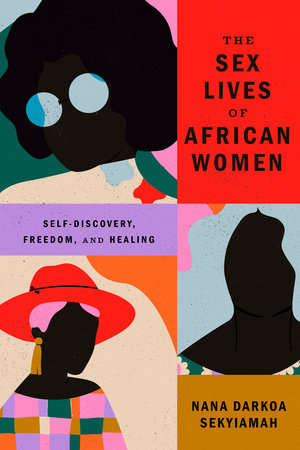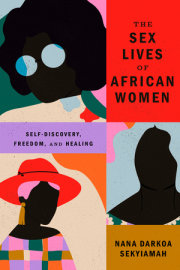PREFACEFOR MORE THAN ten years, I shared my personal experiences of sex on “Adventures from the Bedrooms of African Women,” a blog I cofounded with my friend Malaka Grant. I also facilitated conversations about women’s experiences of sex and pleasure in a variety of public settings, ranging from intimate living-room conversations in Mombasa, Kenya, to public events in Berlin, Germany. I have often spoken and written about the importance of owning one’s body, and my continuing journey in negotiating my own sexuality and desires both within and outside the bedroom. Speaking in public about a subject that is often deemed taboo—especially in the part of the world where I
originate, Ghana—is a political act. I think and write about sex in order to learn how to have better sex. I encourage other women to share their experiences of sex in order to build our collective consciousness around the politics of pleasure. This is critical in a world where women too often lack access to a truly comprehensive sex education.
Black, African, and Afro-descendant women are often told that sex should only be within particular constraints—between people of opposite genders, for instance—and within certain parameters. In some countries, theseparameters are marriage. In other countries the law prohibits some types of sexual acts, or tries to control the choices girls and women have when they experience an unwanted pregnancy.
In
The Sex Lives of African Women, individual women from across the African continent and its global Diaspora speak to their experiences of sex, sexualities, and relationships. It was really important to me as a Pan-African feminist that a book about African women’s experiences of sex-centered continental Africans, and included the experiences of Africans who have been violently displaced by the legacies of slavery and colonization, as well as those who have voluntarily migrated to other parts of the world. For this reason I was especially pleased to interview women of African descent from places like Haiti, Barbados, and Costa Rica.
The stories in this book are based on in-depth interviews I conducted between 2015 and 2020, with women between the ages of twenty-one to seventy-one, from thirty-one countries across the globe. I made conscious efforts to interview women who came from a broad range of backgrounds:
across socioeconomic lines, women of faith and women who practice no particular religion, women for whom English was not their first language, and women representative of communities that have been historically marginalized in society. The biggest challenge for me personally was interviewing women
who were not native English speakers because in one instance it meant speaking through a translator, and it also meant that I ended up speaking primarily to women who were also fluent in English. I can see how my book would be even more rich in content if I had interviewed women in a variety of African languages, for instance. When I started working on this project, I focused on interviewing people face-to-face, a goal that was made possible by the privilege of my job, which allows me to travel across the globe. That changed with the COVID-19 pandemic, and I started to do more interviews via video. One particular woman and I ended up concluding our conversation via a series of voice notes because she lives in a country with poor internet connectivity that also experiences frequent power outages.
In my introduction to each story I describe each woman as she self-identified. This allows me to show the diversity of ways in which people see themselves, whether they identify as cis women, femmes, trans, heterosexual, or pansexual, for instance. I also share people’s ages and their country of origin
and residence in order to contextualize their experiences. A significant proportion of the women I interviewed represented more than one nation, and had their sexual encounters shaped by the various countries they had lived in and cultures they had experienced. After speaking to more than thirty women for this book, I started to see several common threads weaving through the threads that I also see reflected in my own life. My conclusion is very much this: we’re all on a journey towards sexual freedom and agency. In order to get there we need to heal. Healing looks different for everybody. For some ofthe women in this book, healing came about through celibacy and spiritual growth. For others, healing came through taking back power as a dominatrix and sex worker. For some others, healing is still part of the journey they need to travel.
Many of the women I spoke to inspired me with the realities of how they live their best sexual lives. This included deeply personal stories: for example, about navigating freedom and polyamory in conservative Senegal, or resisting the erasure of lesbian identity and finding queer community in Egypt in the midst of a revolution. African women grapple with the trauma of sexual abuse, and resist religious and patriarchal edicts in order to assert their sexual power and agency. They do this by questioning and resisting societal norms while creating new norms and narratives that allow them to be who they truly are. The journey towards sexual freedom is not a linear one, or one that is fixed and static. Freedom is a state that we are constantly seeking to reach.
Copyright © 2022 by Nana Darkoa Sekyiamah. All rights reserved. No part of this excerpt may be reproduced or reprinted without permission in writing from the publisher.





